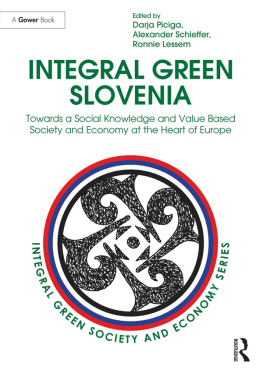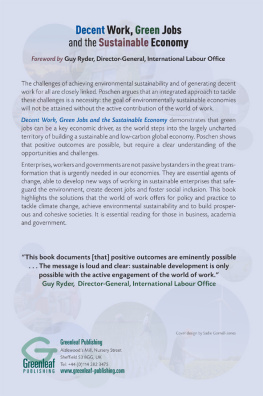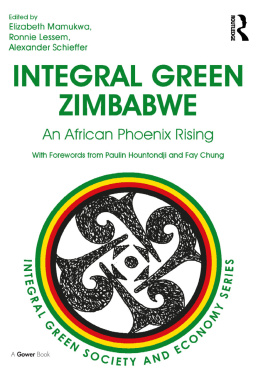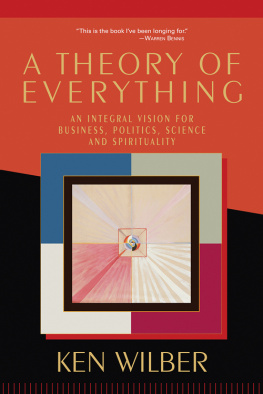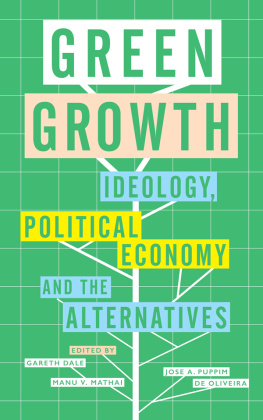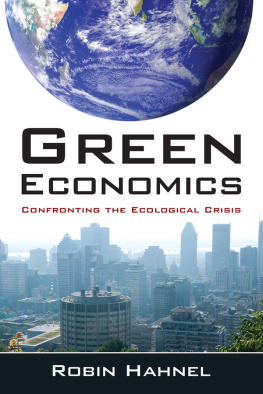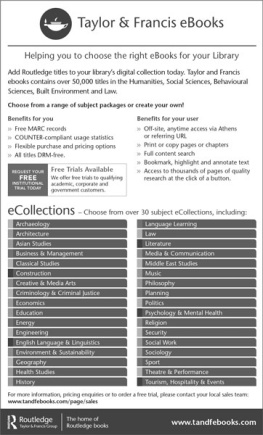First published 2016
by Routledge
2 Park Square, Milton Park, Abingdon, Oxon OX14 4RN
and by Routledge
711 Third Avenue, New York, NY 10017
Routledge is an imprint of the Taylor & Francis Group, an informa business
2016 selection and editorial matter, Darja Piciga, Alexander Schieffer and Ronnie Lessem; individual chapters, the contributors
The rights of Darja Piciga, Alexander Schieffer and Ronnie Lessem to be identified as the authors of the editorial material, and of the authors for their individual chapters, has been asserted in accordance with sections 77 and 78 of the Copyright, Designs and Patents Act 1988.
All rights reserved. No part of this book may be reprinted or reproduced or utilised in any form or by any electronic, mechanical, or other means, now known or hereafter invented, including photocopying and recording, or in any information storage or retrieval system, without permission in writing from the publishers.
Trademark notice: Product or corporate names may be trademarks or registered trademarks, and are used only for identification and explanation without intent to infringe.
British Library Cataloguing in Publication Data
A catalogue record for this book is available from the British Library
Library of Congress Cataloging-in-Publication Data
A catalog record for this book has been requested
ISBN: 978-1-4724-6948-9 (hbk)
ISBN: 978-1-3155-8893-3 (ebk)
Typeset in Baskerville
by Apex CoVantage, LLC

This is a fascinating book about an extraordinary journey towards an Integral Green Slovenia, a vision of a sustainable society and economy. It argues that values and a moral economic core are the foundations of long-term sustainable economy and business, comprising all actors and all sectors.
It shows that local communities, and green and social businesses, inspired by their cultural heritage and looking beyond national boundaries and short-term interests, will contribute to a renewed global partnership that will help us in caring for our world, for our common home.
The book should be of particular interest for all those looking for new, complementary, and alternative pathways of development. I hope each reader will learn something from this book, as I did. This is a very timely book coming as it does when our entire world faces so many changes.
Dr. Hoesung Lee, Chair of the Intergovernmental Panel on Climate Change (IPCC) / IPCC was awarded with the Nobel Peace Prize in 2007, shared with the former US Vice-President Al Gore
The great value of Integral Green Slovenia lies in its promotion of an integral green economy that is based on moral values, cultural heritage and sustainable development. Also, its universality is outstanding; the Slovenian examples of good practice shared in the book can serve as inspiration for the world at large. It shows convincingly that deep values and a clearly articulated moral economic core are prerequisites for equity, equality and a sustainable economy. It thereby is in perfect harmony not only with Pope Francis recent encyclical Laudato Si, but also with the principles of the work that my friends and I are carrying out in Madagascar; there, our overarching goal is to help poor children to achieve a decent life instead of getting lost in poverty and crime in the streets of the cities. If the world decides to follow the path presented by Integral Green Slovenia, it will help enormously to eradicate poverty, save the climate, and make the world a better place for all. It is my wish that this book receives a lot of positive echoes in Slovenia and around the world.
Pedro Pablo Opeka, known as Father Opeka, Slovenian-Argentinean Catholic priest and missionary, Founder of Akamasoa in Madagascar, awarded with Legion of Honour
Everything has its time and for Integral Green Slovenia: Towards a Social Knowledge and Value Based Society and Economy at the Heart of Europe, edited by Darja Piciga, Alexander Schieffer and Ronnie Lessem, its time has come. As Europe is looking to create a new identity for itself, the dissolving of the old systems and silos is becoming more obvious every day. The trios methodology, through invitation to explanation and then elaboration and participation is exemplary in its truly democratic approach, and in this approach is real resilience. Buy and read the book, become informed, it explores some major new thinking and ways of thinking; you wont regret it!
Lawrence Bloom, Secretary General Be Earth Foundation, a UN Intergovernmental Organisation, London, UK; Former Chairman of UNEPs (United Nations Environment Programme) Green Economy Initiative, Green Cities, Buildings and Transportation Council; Former and First Chairman of the Global Agenda Council on Urban Management at the World Economic Forum
Concepts of Sustainable development have been very prominently placed in scientific discourse as well as in development policies for several decades already. The ways these concepts are translated to concrete regional policies and decision-making are different from case to case. This book presents the Slovenian way of conceptualizing and applying these concepts in several local and regional cases. The real value of the book is that in addition to innovative concepts of sustainable development it presents what these concepts actually mean for concrete businesses and citizens in a number of specific case studies. Because Circular economy and sustainability are at the top of the political agenda of the European Commission, we very much welcome the book Integral Green Slovenia and have no doubt that it is very useful reading for scholars and policy makers.
Dr. Zoran Stani, Head of European Commission Representation in Slovenia
There is no other way for humanity on earth to prosper than to follow an integrated approach to sustainable development. I know that choosing this path is a very complex and difficult way that people often consider impossible. But there are a few pioneers who are treating the impossible as though it is possible. Those pioneers are artists with enough life experience to continuously create something out of nothing. Integral Green Slovenia represents such an integrated approach towards sustainable development on a societal level driven by a courageous citizens initiative.
Dr. Ibrahim Abouleish, Chairman of SEKEM Group and Founder of Heliopolis University for Sustainable Development, Egypt; Winner Right Livelihood Award (Alternative Nobel Price 2003)
Alexander Schieffer, Ronnie Lessem and Darja Piciga
Summary
This book tells the unique story of a society pursuing a newly holistic and green approach to economics. The story is framed byand at the same time demonstrated throughstories of integral communities and organisations on a path of social innovation for sustainability.
The story takes us to Slovenia: a country located at the historic crossroads of European civilisation; a country dedicated to the European Union, which it joined only in 2004; a country which has a unique human and natural potential, but which faces enormous economic and political difficulties; a country searching for a new, sustainable economic model that is authentic to its own social and cultural context, that can serve to address its difficulties and release its full potential, and that can, simultaneously, make a contribution to the sustainable development of the European Union.
This is the story of Slovenia moving towards an integral green economy and society.
This is the story of the Citizens Initiative for an Integral Green Slovenia.
This opening prologue guides you into this story through four steps. The first step is an invitation, in which the backdrop to this remarkable journey is revealed and in which you are invited to actively join in. The second step is explanation; here the key terms integral, green and economy are explained, in light of the unique approach the Slovenian Citizens Initiative, founded in 2013 by Darja Piciga and a number of other Slovenian pioneers, has taken. In the third step, elaboration, you are introduced to the actual integral economic and developmental approach, developed by Ronnie Lessem and Alexander Schieffer of the Trans4m Center for Integral Development, which serves as the underlying conceptual framework and process. Finally, in the fourth step, participation, the storyline of this book is sharedillustrating, through all chapters, what the interconnected members of the Citizens Initiative for an Integral Green Slovenia and other socially responsible Slovenians have achieved over the past few yearsin theory and in practiceto foster the integral green economic and societal agenda. Being exposed, in introductory form, to all the books chapters, you receive an initial understanding of how a remarkable variety of institutions and individuals from all sectorsfrom private enterprises to educational institutions, from educators to researchers, from grassroots initiatives to social enterprises, from government officials to artistsare working together to make Integral Green Slovenia a reality.
Next page
